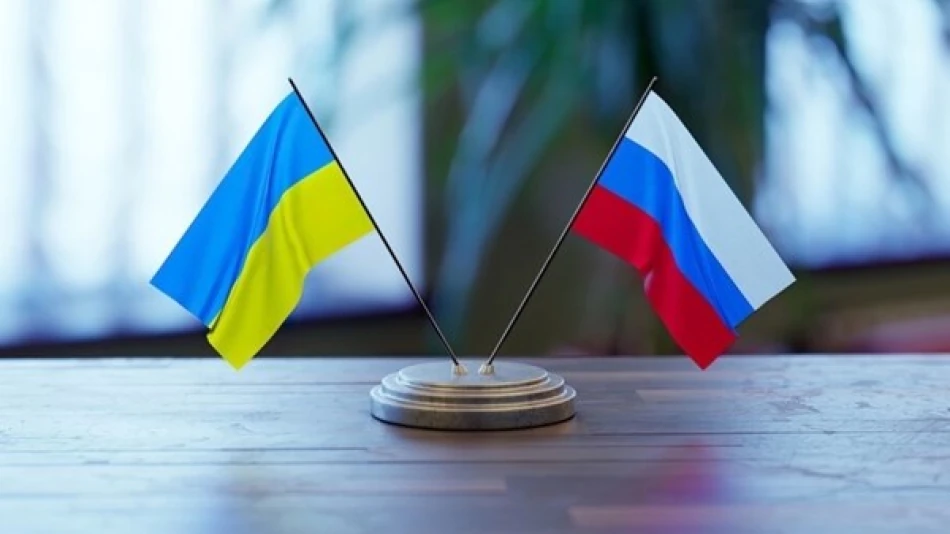
Istanbul Hosts Next Round of Russia-Ukraine Negotiations
Russia-Ukraine Talks Resume in Istanbul Amid Diminished Expectations for Peace
Russian and Ukrainian negotiators are meeting in Istanbul today for their third round of direct talks since May, marking a continuation of the first diplomatic engagement between the two nations in over three years. However, both sides have significantly lowered expectations for any breakthrough toward ending the three-year conflict, with discussions likely to focus on prisoner exchanges rather than substantive ceasefire negotiations.
Limited Scope Reflects Entrenched Positions
Ukrainian President Volodymyr Zelensky has effectively ruled out detailed ceasefire discussions, telling diplomats in Kyiv on Monday that Wednesday's meeting would instead prioritize the return of Ukrainian prisoners of war and children allegedly abducted by Russia. The Ukrainian leader also indicated the talks would serve as preparation for potential presidential-level meetings, suggesting a longer diplomatic timeline than many observers might hope for.
This cautious approach reflects the reality that neither side appears ready for the kind of comprehensive negotiations that would be necessary to end active hostilities. Instead, the talks represent a more modest effort to manage humanitarian aspects of the conflict while keeping diplomatic channels open.
Moscow Pushes for Broader Peace Framework
Russia is taking a different approach, insisting that discussions should address previously exchanged documents outlining potential pathways to peace. However, Kremlin spokesperson Dmitry Peskov has also tempered expectations, warning that "significant diplomatic efforts" would be required to achieve any convergence on ceasefire terms.
This divergence in priorities—Ukraine focusing on immediate humanitarian concerns while Russia seeks broader political discussions—illustrates the fundamental gap that continues to separate the two sides. Moscow's emphasis on previously exchanged peace proposals suggests it wants to revisit territorial and political concessions that Ukraine has likely rejected.
Prisoner Exchanges: The One Success Story
The talks have produced tangible results in one area: large-scale prisoner exchanges that have recently included soldiers under 25 and those with serious injuries. These humanitarian gestures represent the most concrete achievement of the diplomatic process and provide both sides with domestic political benefits while building minimal trust.
The prisoner exchange mechanism has become a crucial confidence-building measure, demonstrating that even amid ongoing conflict, both governments can deliver results to their populations. For families of captured soldiers, these exchanges represent the most immediate and meaningful outcome of any diplomatic engagement.
High-Level Representation Signals Continued Commitment
Both sides are sending senior officials to Istanbul, with Russia represented by presidential adviser and former culture minister Vladimir Medinsky, while Ukraine's delegation will be led by former defense minister Rustem Umerov, who now heads the National Security and Defense Council. The seniority of these representatives suggests both governments remain committed to the diplomatic process, even if expectations remain modest.
The choice of Istanbul as a venue also carries symbolic weight, as Turkey has positioned itself as a neutral mediator throughout the conflict. Turkish President Recep Tayyip Erdogan has maintained relationships with both Putin and Zelensky, making Istanbul a diplomatically acceptable location for sensitive discussions.
Managing Expectations in a Protracted Conflict
The deliberately low expectations surrounding these talks reflect a broader shift toward accepting the conflict's protracted nature. Rather than seeking immediate resolution, both sides appear focused on managing the conflict's humanitarian costs while maintaining the possibility of future escalation or de-escalation.
This approach mirrors other frozen conflicts where periodic diplomatic engagement serves to prevent total breakdown of communication while avoiding the difficult compromises necessary for genuine peace. The Istanbul talks may represent not progress toward resolution, but rather institutionalization of a managed conflict that could persist for years.
Most Viewed News

 Layla Al Mansoori
Layla Al Mansoori






